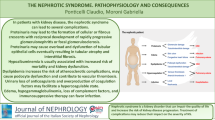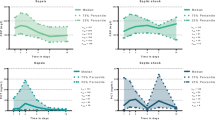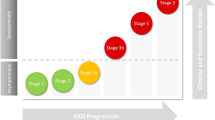Abstract
Objectives
C-reactive protein (CRP) is increased in end-stage renal disease patients. Recent studies have shown positive associations between inflammatory markers and cardiovascular mortality in kidney transplant recipients. The aim of the present study was to examine the correlation between CRP and early detection of renal allograft rejection. Furthermore, investigate the association between pretransplant levels of CRP with the development of acute renal allograft rejection as a possible predictive marker.
Methods
Ninety-one renal transplant recipients were sequentially analyzed. The median follow up of patients was 8 weeks. Basal and 8 weeks post transplant CRP levels were assessed.
Results
CRP levels were significantly higher in allograft rejection both in the pretransplant (n = 25, P = 0.001) and postransplant (n = 33, P = 0.001) phases when compared to those without rejection. By stepwise multiple regression analysis, rejection in transplanted patients was independently correlated to albumin/creatinine ratio and CRP 8 weeks after transplantation.
Conclusion
Elevated pretransplant serum CRP level is a risk predictor for acute rejection episodes and may be a useful predictive marker in the follow-up of post-transplantation patients.
Similar content being viewed by others
References
Desvaux D, Schwarzinger M, Pastural M, Baron C, Abtahi M, Berrehar F, Lim A, Lang P, le Gouvello S (2004) Molecular diagnosis of renal-allograft rejection: correlation with histopathologic evaluation and antirejection-therapy resistance. Transplantation 78(5):647–653
Fink JC, Onuigbo MA, Blahut SA, Christenson RH, Mann D, Bartlett ST, Weir MR (2002) Pretransplant serum C-reactive protein and the risk of chronic allograft nephropathy in renal transplant recipients: a pilot case-control study. Am J Kidney Dis 39(5):1096–1101
Varagunam M, Finney H, Trevitt R, Sharples E, McCloskey DJ, Sinnott PJ, Raftery MJ, Yaqoob MM (2004) Pretransplantation levels of C-reactive protein predict all-cause and cardiovascular mortality, but not graft outcome, in kidney transplant recipients. Am J Kidney Dis 43(3):502–507
Perez RV, Brown DJ, Katznelson SA, Dubin JA, Müller HG, Chang T, Rudich SM, McVicar JP, Kaysen GA (2000) Pretransplant systemic inflammation and acute rejection after renal transplantation. Transplantation 69(5):869–874
Jabs WJ, Meier M, Lamprecht P, Steinhoff, Nitschk M (2011) Local expression of C-reactive protein is associated with deteriorating graft function in acute and chronic failure of kidney transplants. Nephron Clin Pract 117(4):c390–c397
Krüger B, Walberer A, Debler J, Böger CA, Farkas S, Reinhold SW, Obed A, Schlitt HJ, Fischereder M, Banas B, Krämer BK (2010) Is inflammation prior to renal transplantation predictive for cardiovascular and renal outcomes? Atherosclerosis 210(2):637–642
Sancho A, Pastor MC, Bayés B, Sánchez A, Morales-Indiano C, Doladé M, Romero R, Lauzurica R (2010) Posttransplant inflammation associated with onset of chronic kidney disease. Transplant Proc 42(8):2896–2898
Martínez-Dolz L, Almenar L, Reganon E, Vila V, Sánchez-Soriano R, Martínez-Sales V, Moro J, Agüero J, Sánchez-Lázaro I, Salvador A (2009) What is the best biomarker for diagnosis of rejection in heart transplantation? Clin Transplant 23(5):672–680
Böger CA, Götz A, Stubanus M, Banas B, Deinzer M, Krüger B, Holmer SR, Schmitz G, Riegger GA, Krämer BK (2005) C-reactive protein as predictor of death in end-stage diabetic nephropathy: role of peripheral arterial disease. Kidney Int 68(1):217–227
Grootendorst DC, de Jager DJ, Brandenburg VM, Boeschoten EW, Krediet RT, Dekker FW (2007) Excellent agreement between C-reactive protein measurement methods in end-stage renal disease patients-no additional power for mortality. Prediction with high-sensitivity CRP. Nephrol Dial Transplant 22(11):3277–3284
Brull DJ, Serrano N, Zito F, Jones L, Montgomery HE, Rumley A, Sharma P, Lowe GD, World MJ, Humphries SE, Hingorani AD (2003) Human CRP gene polymorphism influences CRP levels: implications for the prediction and pathogenesis of coronary heartdisease. Arterioscler Thromb Vasc Biol 23(11):2063–2069
Prasad K (2006) C-reactive protein (CRP)-lowering agents. Cardiovasc Drug Rev 24(1):33–50
Srivastava M, Eidelma O, Torosyan Y, Jozwik C, Mannon RB, Pollard HB (2011) Elevated expression levels of ANXA11, integrins β3 and α3, and TNF-α contribute to a candidate proteomic signature in urine for kidney allograft rejection. Proteomics Clin Appl 5:311–321
Author information
Authors and Affiliations
Corresponding author
Rights and permissions
About this article
Cite this article
Roshdy, A., El-Khatib, M.M., Rizk, M.N. et al. CRP and acute renal rejection: a marker to the point. Int Urol Nephrol 44, 1251–1255 (2012). https://doi.org/10.1007/s11255-011-0098-4
Received:
Accepted:
Published:
Issue Date:
DOI: https://doi.org/10.1007/s11255-011-0098-4




